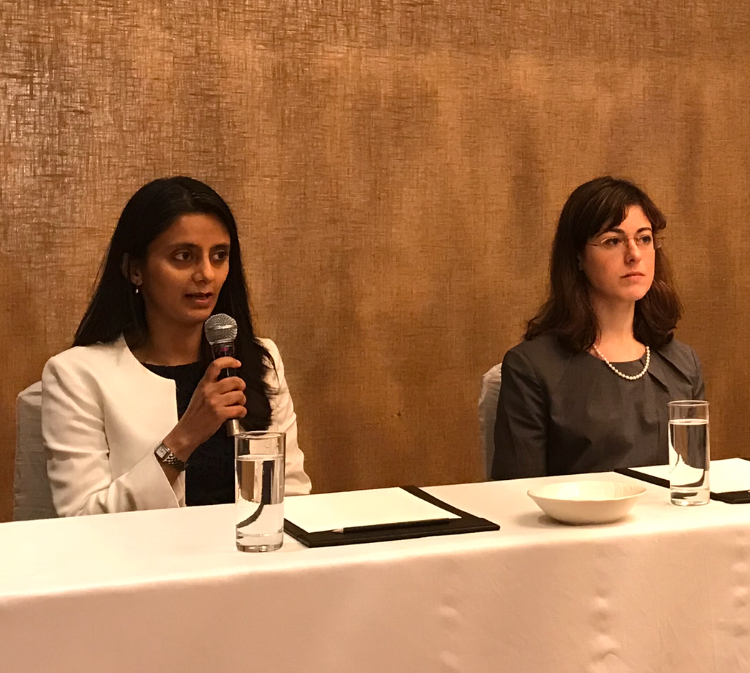Monetary tightening, protectionism among biggest threats to markets in 2018

Standard Chartered Bank economists Madhur Jha and Sonia Meskin
Even against the backdrop of favorable global economic growth prospects, investors should be wary of key risks that may escalate from the simultaneous unwinding of monetary stimuli by major central banks, emerging trade protectionism and rising debt stocks in some markets this year.
This was according to global economists from British bank Standard Chartered, which recently came out with a research titled “Beware of the Dog” that highlighted the key risks that could emerge this year.
Stanchart is optimistic about global growth this year, which it expects to pick up to 3.9 percent from 3.7 percent last year.
“But there’s a key difference to the growth story that we have this year compared to previous few years,” London-based Stanchart head of thematic research Madhur Jha said in a briefing in Manila.
In the last few years, Jha said the United States was the major driver of economic growth while growth in many emerging markets weakened due to the decline in commodity prices. In 2018, she said global growth would be a lot more broad-based across emerging markets and developed world.
“With this very benign and optimistic growth story, we think there are risks that markets become too complacent,” she said.
One key risk that investors should keep in mind this year is that major central banks are starting to normalize monetary policy—something that the global economy was not used to.
Unlike the past 10 years when monetary policies were simultaneously accommodative, Jha said even the European Central Bank was now starting to reduce its stimulus program while the US Federal Reserve was already tightening interest rates. There are concerns that Bank of Japan would also tighten monetary settings but Jha said this was unlikely to happen anytime soon.
“With all of these central banks simultaneously tightening policy, we are going to see markets beginning to react, especially in the second half of 2018,” Jha said. “We didn’t see that risk last year, except for the Fed. It’s only this year when you see simultaneous withdrawals from ultra-accommodate monetary stance.”
The second key risk is that global trade may slow down this year compared to last year alongside risks of rising trade friction.
Jha said China’s restocking process, referring to an increase in production to boost inventories, perked up global trade last year. Demand from China is seen to ease this year. At the same time, she noted rising trade friction as the United States started imposing tariffs on washing machines and solar panels, mostly affecting China and South Korea which were dominating these segments. US President Trump has also threatened to pull out of the trilateral North American Free Trade Agreement (Nafta).
“While President Trump talked about trade in the campaign trail, what happened in 2017 was that a lot of the talk became domestic matters—such as affordable healthcare act and changes in tax code—thus, geopolitical concerns receded. But now again, with the tax bill passed, I think focus will be a bit more on foreign policy where the President has considerably more leeway to effect change without congressional approval,” said Sonia Meskin, Stanchart US economist.
High debt levels in some markets – whether national, household or corporate – will also be a key risk this year, the economists said.
“As liquidity tightens globally, markets will differentiate between markets that look good or those that will be vulnerable,” Jha said.
Jha said geopolitical risks, on the other hand, would remain very difficult to predict. In recent years, such risks emanated from recurring tension in the Korean peninsula or the Middle East.
